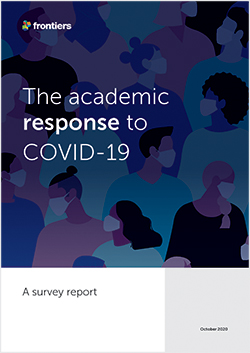- Frontiers, Lausanne, Switzerland
COVID-19 has posed an unprecedented challenge to the international scientific community. Along with the disruption faced by most of the world's population, many researchers have felt an added pressure to understand, cure and mitigate the virus. In order to gain insight into what impact COVID-19 has had on the international scientific community, their work and the implications for science, we conducted a survey with our editors, reviewers and authors in May and June 2020. In one of the largest academic surveys ever conducted, 25,307 members of our academic community participated, representing diverse countries, roles, and areas of research.
Summary of key findings
1. Despite the massive disruption, researchers' day to day work has not been significantly affected by COVID-19 at the time of the survey, with many able to continue their professional role throughout.
2. Many researchers expressed that policy makers had not sufficiently taken scientific advice into account to mitigate the pandemic.
3. Nearly half of the researchers surveyed fear that the pandemic will have a long-lasting effect on funding.
4. Researchers ask that policy makers invest more funding into basic research, and better ways for science to advise policy and decision making.
5. The pandemic has encouraged many to reconsider how they share their work with researchers more likely to publish open access, share their data and use preprint servers.
6. Most researchers want to contribute to task forces, primarily with research into the virus itself or through interdisciplinary knowledge-sharing.
7. There is concern about future pandemics, but researchers are equally concerned about climate change, which we can prepare for and mitigate with the help of science.
8. Researchers stress the importance of learning from the COVID-19 pandemic, allowing us to become more resilient in the future.
Report
Read the full report to gain insight into what impact COVID-19 has had on researchers, their work and the implications for science.
Supplementary Material
The Supplementary Material for this article can be found online at: https://www.frontiersin.org/articles/10.3389/fpubh.2020.621563/full#supplementary-material
Data Sheet 1. The academic response to COVID-19 survey data.
Conflict of Interest
This survey was conceptualized, conducted, analyzed and produced by Frontiers, led by Chantelle Rijs, Director of Communications and Frederick Fenter, Executive Editor.
These results have not been peer-reviewed and represent only a subset of the full collection of responses. The dataset provided as the supplementary material is the data used by Frontiers to create the survey report. A full dataset is available on request. Please send enquiries to: Y2hhbnRlbGxlLnJpanNAZnJvbnRpZXJzaW4ub3Jn.
This survey was run on Qualtrics, who provided complimentary access to their platform. It was conducted in the absence of any commercial or financial relationships that could be construed as a potential conflict of interest.
Acknowledgments
We would like to thank all 25,307 Frontiers authors, editors and reviewers who participated, for their ongoing dedication to science and uniting against COVID-19. We would also like to thank our internal key contributors for their work in creating this report.
Keywords: SARS-CoV-2, COVID-19, coronavirus, survey, international survey, science policy, open access, open science, challenge, shared research, essential cooperation, preparedness, resilience
Citation: Rijs C and Fenter F (2020) The Academic Response to COVID-19. Front. Public Health 8:621563. doi: 10.3389/fpubh.2020.621563
Received: 26 October 2020; Accepted: 28 October 2020;
Published: 28 October 2020.
Edited and reviewed by: Frontiers, Lausanne, Switzerland
Copyright © 2020 Frontiers. This is an open-access article distributed under the terms of the Creative Commons Attribution License (CC BY). The use, distribution or reproduction in other forums is permitted, provided the original author(s) and the copyright owner(s) are credited and that the original publication in this journal is cited, in accordance with accepted academic practice. No use, distribution or reproduction is permitted which does not comply with these terms.
*Correspondence: Chantelle Rijs, Y2hhbnRlbGxlLnJpanNAZnJvbnRpZXJzaW4ub3Jn
 Chantelle Rijs
Chantelle Rijs Frederick Fenter
Frederick Fenter